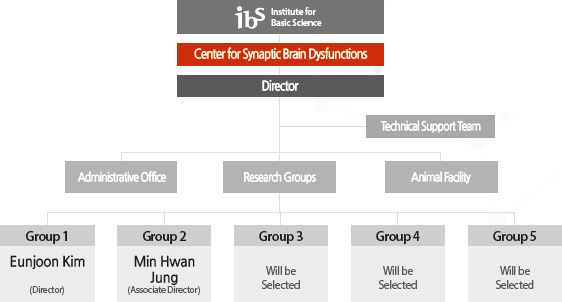주메뉴
- About IBS 연구원소개
-
Research Centers
연구단소개
- Research Outcomes
- Mathematics
- Physics
- Center for Underground Physics
- Center for Theoretical Physics of the Universe (Particle Theory and Cosmology Group)
- Center for Theoretical Physics of the Universe (Cosmology, Gravity and Astroparticle Physics Group)
- Dark Matter Axion Group
- Center for Artificial Low Dimensional Electronic Systems
- Center for Theoretical Physics of Complex Systems
- Center for Quantum Nanoscience
- Center for Exotic Nuclear Studies
- Center for Van der Waals Quantum Solids
- Center for Relativistic Laser Science
- Chemistry
- Life Sciences
- Earth Science
- Interdisciplinary
- Center for Neuroscience Imaging Research (Neuro Technology Group)
- Center for Neuroscience Imaging Research (Cognitive and Computational Neuroscience Group)
- Center for Algorithmic and Robotized Synthesis
- Center for Nanomedicine
- Center for Biomolecular and Cellular Structure
- Center for 2D Quantum Heterostructures
- Institutes
- Korea Virus Research Institute
- News Center 뉴스 센터
- Career 인재초빙
- Living in Korea IBS School-UST
- IBS School 윤리경영


주메뉴
- About IBS
-
Research Centers
- Research Outcomes
- Mathematics
- Physics
- Center for Underground Physics
- Center for Theoretical Physics of the Universe (Particle Theory and Cosmology Group)
- Center for Theoretical Physics of the Universe (Cosmology, Gravity and Astroparticle Physics Group)
- Dark Matter Axion Group
- Center for Artificial Low Dimensional Electronic Systems
- Center for Theoretical Physics of Complex Systems
- Center for Quantum Nanoscience
- Center for Exotic Nuclear Studies
- Center for Van der Waals Quantum Solids
- Center for Relativistic Laser Science
- Chemistry
- Life Sciences
- Earth Science
- Interdisciplinary
- Center for Neuroscience Imaging Research (Neuro Technology Group)
- Center for Neuroscience Imaging Research (Cognitive and Computational Neuroscience Group)
- Center for Algorithmic and Robotized Synthesis
- Center for Nanomedicine
- Center for Biomolecular and Cellular Structure
- Center for 2D Quantum Heterostructures
- Institutes
- Korea Virus Research Institute
- News Center
- Career
- Living in Korea
- IBS School
Research Centers
- Research Outcomes
- Mathematics
- Physics
- Center for Underground Physics
- Center for Theoretical Physics of the Universe (Particle Theory and Cosmology Group)
- Center for Theoretical Physics of the Universe (Cosmology, Gravity and Astroparticle Physics Group)
- Dark Matter Axion Group
- Center for Artificial Low Dimensional Electronic Systems
- Center for Theoretical Physics of Complex Systems
- Center for Quantum Nanoscience
- Center for Exotic Nuclear Studies
- Center for Van der Waals Quantum Solids
- Center for Relativistic Laser Science
- Chemistry
- Life Sciences
- Earth Science
- Interdisciplinary
- Center for Neuroscience Imaging Research (Neuro Technology Group)
- Center for Neuroscience Imaging Research (Cognitive and Computational Neuroscience Group)
- Center for Algorithmic and Robotized Synthesis
- Center for Nanomedicine
- Center for Biomolecular and Cellular Structure
- Center for 2D Quantum Heterostructures
- Institutes
- Korea Virus Research Institute
Study of emerging and re-emerging viruses to overcome viral diseases
Tel. 042-878-8111
IBS Korea Virus Research Institute,
55 Expo-ro, Doryong-dong, Yuseong-gu, Daejeon (34126)
Major Publications
Methods for fighting emerging pathogens (Nature methods, 2022)
Director

Director CHOI Young Ki
CHOI Young Ki is the director in the Center for Study of Emerging and Re-emerging Viruses at the Korea Virus Research Institute. Director Choi obtained his B.S and M.S. from the College of Veterinary Sciences at Chungnam National University and went on to receive a Ph.D. in Virology at the University of Minnesota. He has served as a professor at Chungbuk National University’s College of Medicine, where he conducted research on the mechanisms by which viruses infect hosts as well as vaccine development. His recent studies on COVID-19 have garnered much attention at home and abroad, which include establishing the animal model of COVID-19 infection and transmission, as well as studying the monoclonal antibody treatment for COVID-19.
Introduction

Study on emerging and re-emerging viruses (One Health approach)
- 1. Pathogenesis of novel variants of important viral pathogens: Novel virus identification, pathogenesis, and virulence marker investigation
- 2.Disease X and neglected tropical viral diseases including animal viruses: Characterization of pathogenic potentials and interspecies transmission mechanisms
- 3.Vector-borne zoonotic viral diseases: Mosquitoes and tick-borne mediated viral diseases
- 4.Novel control technology: Innovative diagnostic technology, development of novel platforms of therapeutics, and universal vaccines
Research Activities
The Center for Study of Emerging and Re-emerging Viruses aims to explore strategies to respond to future infectious disease outbreaks through studying virus propagation and transmission.
The Center’s research involves the characterization of human coronaviruses including SARS-CoV-2 variants, as well as other viruses that can cause infection in humans such as severe fever with thrombocytopenia syndrome virus (SFTSV), tick-borne viruses, avian influenza viruses, and others.
The Center’s research also focuses on expanding our knowledge on potentially dangerous zoonotic viruses (Disease X). By identifying previously neglected tropical viral diseases with epidemic and pandemic potential, studying known high-risk viral infections/diseases, and developing universal vaccine platform technology, the Center aims to prepare us against any Disease X that we may encounter in the future.
Organization

Main research results
- Early correction of NMDAR function improves autistic-like behaviors in adult Shank2–/– mice.
(Biol Psychiatry, 2019) - Sexually dimorphic behavior, neuronal activity, and gene expression in Chd8-mutant mice.
(Nat Neurosci, 2018) - Differential coding of reward and movement information in the dorsomedial striatal direct and indirect pathways.
(Nat Commun, 2018) - Distinct role of striatal direct and indirect pathways in value-based decision making.
(Elife, 2019) - Social deficits in IRSp53 mutant mice improved by NMDAR and mGluR5 suppression.
(Nature Neuroscience. 2015)
Personnel
| Total | 62 |
|---|---|
| Gender | 32(Male), 30(Female) |
| Korean/ International | 59(Korean), 3(International) |
Degree
Position
As of October. 2019











